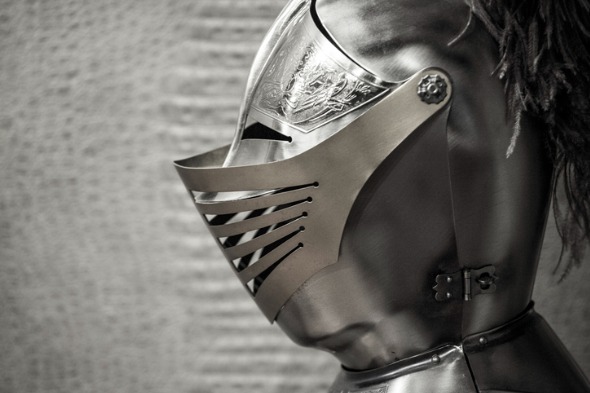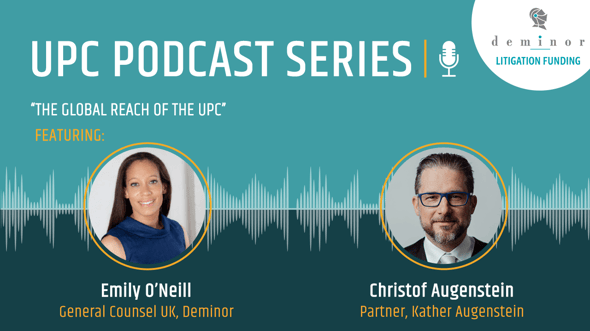In this podcast series, Emily O'Neill General Counsel UK and Global Intellectual Property lead for Deminor Litigation Funding, undertakes interviews with global professionals to understand the implications of the new Unified Patent Court (UPC).
Deminor welcomes you to join this conversation as we summarise the key elements of the conversations between Emily O'Neill and these experts, as captured in the podcast transcripts below.
What is the UPC?
The Unified Patent Court (UPC) is a new European court system designed to harmonise and simplify the patent dispute landscape in Europe.
The UPC was established in order to provide a unified patent enforcement system with jurisdiction over ratifying EU member states. Countries that are Member States of the European Patent Convention (EPC) but are not EU member states cannot join the Unitary Patent or Unified Patent Court. As a unified court with a multi-state jurisdiction, the UPC hopes to be faster, more efficient and more cost-effective in resolving patent disputes.
The UPC's structure is made up of a Court of First Instance that is divided into central, local and regional divisions. Its central divisions are located in Paris and Munich. The third seat of the central division was originally assigned to London. The Italian Foreign Office published a press release that an agreement has been reached with France and Germany to set up a branch of the Central Division in Milan. This agreement now needs to be approved by the other UPC contracting states during the next meeting of the Administrative Committee in June 2023. The press release states that the Milan court is in the process of being set up and will be operational within the next year. In the interim, the Presidium of the UPC decided, that initially, the Paris and Munich central division seats will share this caseload. Cases concerning human necessities are assigned to Paris and those involving chemistry and metallurgy to Munich for now.
The UPC’s Sunrise period launched on March 1st and allowed patentees to opt out of the exclusive jurisdiction of the new system to take effect from the court coming online on 1 June. Approximately 460,000 European patents and patent applications have been opted-out during Sunrise. Opt-outs are still possible now and at least during the 7-year transition period, unless proceedings are pending in the UPC, and will take effect once filed.
However, this is a new and untested forum, located in civil law jurisdictions but with elements of common law such as disclosure, cross-examination and adverse party costs. Notable jurisdictions such as the UK and Spain are not within the UPC - How will companies mitigate their commercial litigation risks in this environment?
Podcast Preface:
Deminor General Counsel UK, Emily O'Neill (EON), speaks with Christof Augenstein (CA), Partner at Kather Augenstein and Chair of the UP/UPC Standing Committee at AIPPI.
In this interview with Emily O’Neill, Christof provides valuable insight into the upcoming Unified Patent Court (UPC), discusses its wider significance and outlines his predictions for the early days of the new system and beyond.
Podcast Transcript:
EON - What types of organisations are planning to leave their patents in the UPC system?
CA - Many large corporates and more sophisticated clients are taking what we call a ‘mixed litigation’ approach. They look for members of particular patent families and leave some of them in the UPC system, while others are left out. And actually, that's what we recommend, because it gives you the best of both worlds. You can have patent families with very similar technologies, where the single members only have one or two additional features. The basic concept of the technology is the same, which means that a product is likely to be infringing both patents. If you have one in the UPC system, and one in the existing national system, you can work in parallel. I think that's feasible. There's some concern about German law which has a provision that you must assert all the patents at one time, but I think this is limited to German law, so I don't see any major issue with that. So, in summary, I think the mixed litigation approach is the way to go, and that means not really deciding between the two systems, but being able to react flexibly to any challenge that you might see. And therefore having the best of both worlds.
In terms of the figures I’ve seen and the numbers that are publicly available for big corporate clients, the opt-out rate is surprisingly low. I've seen figures from bigger clients, where the share of patents opted-out is below 20%. So that means, at least for those more sophisticated clients, they clearly want to use the new system. It's questionable whether they will go there with their crown jewels, or their very best patents, because validity in the whole of Europe is at stake. So that's probably not what you want to risk with your crown jewels. But clearly, for the less important patents or for some divisionals, they will definitely use the UPC system using the mixed litigation approach. And then I expect that we will see a lot of cases when the UPC starts.
EON - Do you expect many applications for Unitary Patents? In terms of value, do you think that companies will stay out of the UPC system for litigating their valuable and important patents?
CA - Unitary patents are of course something that will develop over the next couple of years, with different interests and issues to balance. I'm hesitant to call the unitary patent a success, because the cost of this patent is rather higher than many people have anticipated. Because of this, I don't think the unitary patent will play a significant role in the first five to seven or even 10 years of the UPC. What I expect we’ll see is mainly litigation of classical European patents.
In terms of the second part of your question, which was about the value of the patents that will be litigated, when we're looking at the pharma industry, I think that the big, blockbuster patents will certainly be opted out. The danger that they're going to be revoked is just too significant, and they will want to mitigate that risk.
But aside from that, if you follow this mixed litigation approach, you’ll have some important technologies covered. And that means, even if you lose one, you still have something that would cover it, preventing competitors from copying your product or getting close to the technology that you consider to be valuable.
In that respect, I think that people are probably not going to be that hesitant to enforce important patents at the UPC.
So, to summarise, no I don't think that the valuable patents will stay out of the system, with only the ones that we don't care about being litigated at the UPC.
EON - Some of the commentary around the UPC suggests that it could be a favoured forum with non-practising entities, or NPEs. Could it be a new Western District of Texas? What are your thoughts on that?
CA - It's tempting for any plaintiff to have many big markets resolved in one proceeding. My observations from travelling the world and talking to people in the USA and Asia is that they favour the UPC system because it reduces the complexity of a dispute in Europe. Now, they have only one case they need to deal with. They don't need to coordinate, for example, Italy, France, Germany and other countries, so that from that perspective, it's very attractive for those litigants.
Plus, many of the NPE companies are located overseas. Perhaps that's why they find it attractive to have a forum where they just have one case, without the hassle of coordinating everything.
Even at the start, with only 13 contracting member states, and certainly when we look to the future, when more European countries will join the UPC, we will have a market that is as big as the US, at a cost that is still significantly lower than anything you could imagine in the United States. This fact alone makes it an attractive forum.
I also think that with respect to the reliability of the judgments, we will find that the UPC has at least the same quality as US judges. When we look at the judges that are appointed, I think we’ll find names that are well known in the industry, so we can expect their judgments to be of high quality, and therefore attractive to those litigants.
At the end of the day, I think it will be an attractive forum, because litigants will get more value for less money. In addition, decisions from the UPC will have a much bigger impact than any injunctive relief you will find in Europe these days, and therefore, by definition, it will be a more attractive forum for NPEs as well as for any patentee enforcing patents.

EON - The injunction is one of the more attractive features of the UPC over the current US system where it's very difficult to get an injunction. But to enforce the injunction, will there be a bond payable or a cross undertaking in damages? Do you know what the mechanism will be for enforcement of an injunction granted by the UPC?
CA - When we look at Article 82(4), you will see that the UPC itself can impose recurring penalties on any defendant, if they do not comply with any court order. So that means the mechanism for enforcing the decision is already with the UPC. That’s something that many people do not know yet. When I first came across this rule, I was surprised because what I heard is that enforcement measures with a punitive element would be reserved to national countries only, but this is not the case. In Article 82(3), it says that unless this agreement provides otherwise, national procedure applies along these lines, “without prejudice to this agreement, and statute enforcement procedures shall be governed by the law for contracting member states.”
The important part here is ‘without prejudice to this agreement’. Then the next section says, “if a party does not comply with the terms of an order of the court, the party may be sanctioned with a recurring penalty payment payable to the court.” This shows the ability of the UPC itself to impose penalty payments, so from that perspective, enforcement will be fairly easy. The very same court that has issued the injunctive relief would also impose the penalty payments.
"I've also talked to judges, and their common understanding is that the UPC, except for in very, particular circumstances, will grant injunctive relief" - CA
On the other hand, things become more difficult when we look at what happens if defendants do not pay these penalties. Here, we might run into trouble in getting assets seized etc. In this case, we look again to national case law and procedures to ensure the court gets the money, as the court is the entity that receives all penalty payments now. So, with the UPC we'll have a system that will be able to define penalty payments so that decisions can be enforced right away.
When we talk about injunctive relief, the court has discretionary powers within the UPC system. This is unlike the German system where the judge double-checks whether all the requirements have been fulfilled and then ticks the box that the conditions for a claim have been met. The UPC system is different in the sense that it grants discretionary powers to the court.
The first thing a UPC judgement will tell you is that a patent is valid and infringed. This opens up possibilities for the court to take appropriate measures. One of those measures is injunctive relief, and there is clearly a discretionary element within granting injunctive relief.
This is similar to the UK system, but even under the UK system, I have learned that in the vast majority of cases, British courts grant injunctions despite this discretionary element. I've also talked to judges, and their common understanding is that the UPC, except for in very, particular circumstances, will grant injunctive relief. This will be a significant difference which will make it more attractive for any plaintiff to come to the UPC instead of going to the US.

EON - Over the last few years, some of the top filing organisations at the EPO have been Chinese or Southeast Asian organisations. Do you think that European and US organisations could be crowded out of the UPC by a flood of cases brought by Chinese or Southeast Asian companies?
CA - It's hard to imagine how someone could be flooded out at a court, because you can file your cases, nonetheless. The question is, how long will it take until you get the decision?
But if you’re asking who are likely to be the first users of the system, I don’t think that we will see lots of European ones. Some European companies will litigate using the UPC, but I think it will be particularly attractive for Asian and US companies. As I mentioned, it's much less complicated for them and makes Europe much more manageable when it comes to litigation than it was previously. So yes, I would expect more Asian and US companies to be using the UPC system. I think that's a fair assessment.
EON - You mentioned the time taken to reach a decision. The UPC is aiming to render its decisions in short timescales. Do you think that will make the court plaintiff-friendly?
CA - In theory, yes, but it remains to be seen whether the 12-month timescale to reach a decision will correspond to reality. Twelve months is a very challenging timeline, and I think we will see many cases on the first day of the UPC. I would expect to see a delay, and particularly at the beginning, I think it will be optimistic to expect a first decision within 12 months.
However, I also expect that the divisions at the UPC will try to keep to that schedule, because the judges will want their forum to be attractive, and part of that is about staying within the 12-month timeline.
When you have a time-limited monopoly such as a patent, plaintiffs want a forum where their decision won’t take too long, because otherwise, it will devalue the patent anyway. So speed is always of the essence in patent litigation. Therefore, I would also expect speed to be of the essence at the UPC, and judges will do whatever they can to keep to that timeline.
If they can achieve it, and we do have decisions within a timeframe of 12 months, that's very attractive to any plaintiff because 12 months is extremely fast.

EON – One factor that's really important for funders is to understand the predictability of the UPC as a new court. It may have judges who are known in some cases, but how predictable do you think it will be in terms of the approach to cases and the decision making, given that the judges will be applying a new set of rules in a new forum?
CA - That's a difficult question to answer, because it's hard to anticipate how cases will be dealt with. My impression is that many of the stakeholders, such as lawyers, clients and patent attorneys very much have their national approach in their mind when they're thinking about the UPC. It’s only when you talk to foreign or other European colleagues, that you see that there are many different approaches to many identical situations. It's hard to predict what the Court of Appeal will decide on particular procedural issues.
But this is the concept of the UPC. Unlike in design or trademark cases, we don't have national courts deciding on a European wide level. This is a new court with a completely new set of rules that have no precedent whatsoever. So of course, there are uncertainties. However, I think there are two points that will give clients some degree of certainty. The first one is, for a standard case, the procedures are extremely detailed. You know exactly what to file and it's sufficiently clear what the court will expect. It's a front-loaded procedure which requires you to submit your written arguments and put forward your evidence (if you need to rely on evidence). There will be an interim procedure where the main issues will be identified, and then an oral hearing where the case is decided. So for standard cases, it's quite straightforward.
The second point that I think will give some comfort, is that in the usual countries where you're used to having patent litigation, you can expect to have experienced local judges in the local divisions. So for instance, in Germany, for all of the local divisions we have, there will be two German judges and only one international judge deciding on the case except under some circumstances. So, there will be the three members on the decision-making panel, and two of them will be German. You’d expect that if there is a question of doubt, then the two German judges will be thinking about how we do this in Germany and may decide along the lines of German case law. The same applies in France, where you’ll have two French judges at the Paris local division and there will be two Dutch judges at The Hague division. So there may be some predictability regarding questions of doubt when it comes to procedural issues.
"I'm excited to go to trial, discuss all these new possibilities with the judges, find out what is the best way forward and be more creative." - CA
EON – Are you excited about the new UPC?
CA - Yes, 100%. For a patent litigator, this is a unique and historic opportunity to start a new legal system from scratch. I’ve been working on the UPC for many years. I have liaised with European colleagues, written commentary about the UPC, and had various other engagements regarding the UPC. To me, it's fascinating to approach these legal issues from various different angles. I'm excited to go to trial, discuss all these new possibilities with the judges, find out what is the best way forward and be more creative. The only thing I need is clients that are willing to pay because that's the other issue - this will cost money. The first cases will be more comprehensive, and so they’ll cost more money than the ones we'll be doing five years from now. So with that caveat, yes, I'm very much looking forward to the opportunity to establish a new, suitable and modern system for patent litigation.
EON – Obviously for litigation funding, cost is important. I've also seen that there's a legal aid provision for the UPC. What kinds of organisations can make use of that? And do you think it will be available in the early days, given that the UPC is self-funding?
CA - Article 71 talks about this, and unfortunately, it seems that legal aid is only available to individuals, rather than legal entities. So if you’re an inventor with a privately developed invention, and you’re trying to enforce a patent, you may be able to rely on legal aid. According to Article 71, that's the only situation where legal aid will be available.
The next question is, are there other means of reducing the cost for small and medium sized enterprises? Yes, you can apply for a reduction of court fees, and you can also apply for a reduction of the cap on reimbursable attorney costs, so that reimbursable costs are capped at a lower level. However, if I were a plaintiff, I would never apply for such a measure, because it shows weakness at the very beginning. When you're dealing with a big company, and you basically say that you can't afford the litigation, that will kill you. That's not the way to start, and so as good as those legal aid and cap reduction provisions seem to be, I don’t think they will play any practical role at the UPC.
EON – Who do you think we're going to see as the advocates in the UPC?
CA – As a litigator, and not a patent attorney, this is a question that concerns my professional future. I think that clients will be well advised to look for experienced counsel at the UPC level. Patent attorneys dealing with validity issue proceedings in a civil court setting, don't need to rely on a strategy of disputing facts. But the UPC is very similar to German procedural law, which requires facts to either be established or disputed. If you can't dispute facts efficiently, that fact is deemed to be true. Proceedings for patent attorneys work on a different principle, because the federal patent court and the European Patent Office work differently. So, you don't need to rely as much on the submissions of the party.
Therefore, I strongly believe that the skill set of patent litigators is needed at the UPC, because we’ll have a merging of various different legal systems. You should be familiar with one legal system, and how civil law procedures work in that particular country, but ideally, you will also have some experience with foreign jurisdictions, so you have a better understanding of what issues are at stake and what issues can be dealt with.
"I expect litigators to play a very important role, as legal representatives will lead the UPC." - CA
Decisions at the UPC will be much more important than decisions made at a national level, because they relate to a much bigger market, so there's more at stake.
Again, I would advise clients to look for experienced litigators. Of course, there are patent attorneys that also do a lot of litigation who would be capable of representing clients at UPC level. But just being a patent attorney, with experience of writing patent applications, is not enough, in my opinion, to successfully represent a client at the UPC.
I expect litigators to play a very important role, as legal judges will lead the UPC. Every single division within the UPC will be chaired by a legally qualified judge and legally qualified judges will always have the majority. That is why they will prevail over the opinion of the technical judges.
This means that both technical facts and case law need to be established in a way that the legally-qualified judges will understand. Again, I don't disqualify patent attorneys from this, but this is what litigators have been trained to do. Their job has always been to translate the technical facts to the legal judges. So I would say there is a need for litigators to be involved at the UPC level as well.

CA – As a funder, would you expect the ceilings that are set for adverse party cost reimbursement to actually cover the cost? Or would the cost risk be the maximum reimbursement to the other side?
EON – I think it's going to be the same as when we assess for example, a case in the UK. There isn’t a fixed amount that we know is going to come back. We would take that into account, particularly as this is an unknown entity. Obviously, economics is really important for us. So we need to understand the likely damage and budgets and make sure that the costs and the damages are going to be viable.
I expect we will be taking a conservative approach in the early days, to see what happens in terms of the costs that are awarded and whether the caps are adhered to or whether there's any flexibility that the judges use when they're awarding adverse party costs.
Another point that we're looking at is the availability of insurance. Often in the UK, we would obtain after the event insurance (ATE). But the market is very London-centric, so how available is this insurance going to be for a new court? How are insurers going to react to the new courts? And how willing are they going to be to underwrite that risk?
Potentially, the risks are higher than they would be, for example, in a German action where you have the statutory scale. I think this could be another factor which the plaintiffs or claimants take into account when they decide whether to go to the UPC or go at a national level. This also relates to the US versus UPC, as the US doesn't have an adverse party cost regime.
The benefit of that kind of regime is that you ensure a higher quality of litigation. Vexatious litigation isn't going to be brought to the UPC because of that adverse party cost risk. So I think it will keep the quality of cases higher. But we'll have to see what awards are made, as cases start to come through the system.
CA – Does that influence whether you would accept a case or not? Would you rather fund in the US because you don't have a cost risk? Or would you rather fund a case in Germany, UK or the UPC, because you might get reimbursement if you win?
EON – I think there are two considerations here. Yes, you might get the reimbursement if you win, but you also have to pay if you lose, and it's how you would mitigate that risk. So, we’d look at the entirety of the case. We’d consider the budget, the adverse party cost risk, the potential reimbursement, the timing of settlements, and what's likely to happen with costs in those situations. And we’d build all of that into our model. It needs to make sense economically, so we would use the same formula for assessing the case, whether it’s Germany or the UPC or the UK. But if there is an adverse party cost risk, we would be looking at whether the claimant has insurance for that or whether we would be prepared to provide an indemnity, which would then form part of the funding. We may then take that on our balance sheet, or we may seek an ATE to cover our own risk.

UPC Podcast Series - Next steps and further information:
Thanks for joining Deminor's UPC Podcast Series as we deep dive into the ins and outs of the new Unified Patent Court.
Keep a look out for our upcoming interviews as Deminor General Counsel UK and Global Intellectual Property lead, Emily O'Neil, speaks with several more experts to get their insights on the UPC.
If you would like to connect with either Emily or Christof Augenstein on LinkedIn, please click on the links below:
Deminor, General Counsel UK and Global IP lead - Emily O'Neill
Kather Augenstein, Founding Partner and Chair of the UP/UPC Standing Committee at AIPPI - Christof Augenstein
***
Further Reading:
- https://www.deminor.com/en/case-studies/co-funder-proposes-sharing-of-litigation-funding-risk-to-leverage-deminors-in-house-due-diligence-capability
- https://www.deminor.com/en/case-studies/financing-assertion-of-patents-protecting-manufacturing-processes
- https://www.deminor.com/en/case-studies/telecoms-patent-assertion-multi-jurisdictional-campaigns
- https://www.deminor.com/en/case-studies/canadian-innovative-start-up-preparing-for-a-david-v-goliath-litigation-funding-battle
- https://www.deminor.com/en/case-studies/whats-the-risk-assessing-the-risk-of-counter-assertion-by-the-defendant-in-patent-litigation
- https://www.deminor.com/en/case-studies/overstepping-the-mark-litigation-funding-trade-mark-infringement
- https://www.deminor.com/en/case-studies/lights-camera-action-recovering-damages-for-infringement-of-rights-in-a-short-film
- https://www.deminor.com/en/case-studies/recovering-damages-for-stolen-software-through-litigation-funding
- https://www.deminor.com/en/case-studies/funding-in-the-pharma-sector-/-investing-in-a-case-where-litigation-is-already-ongoing





